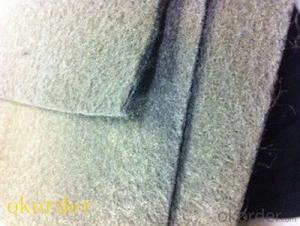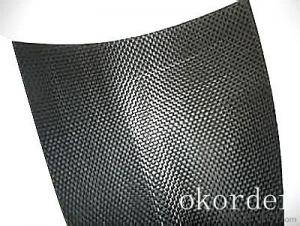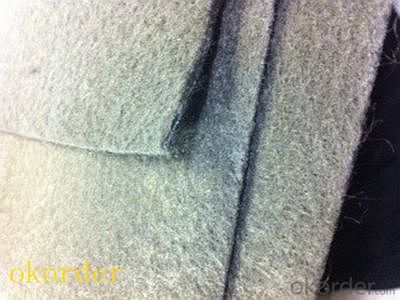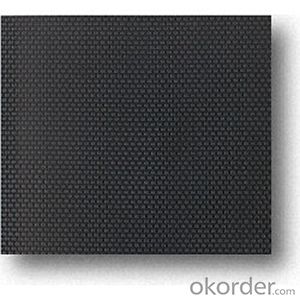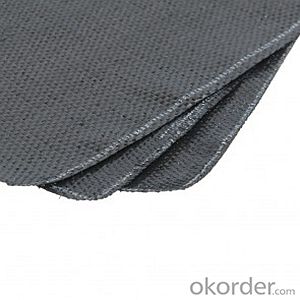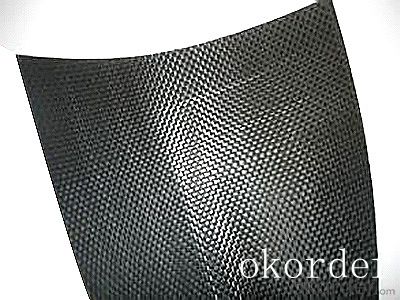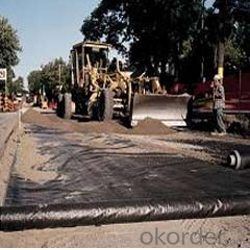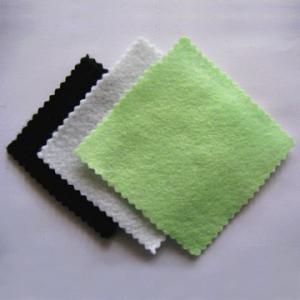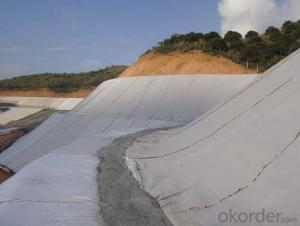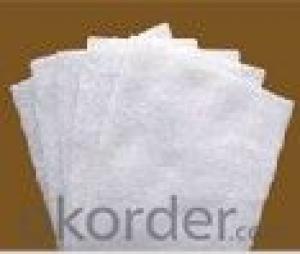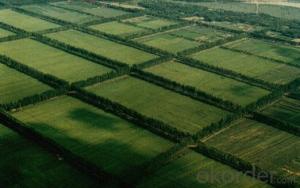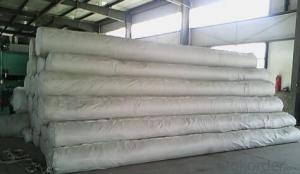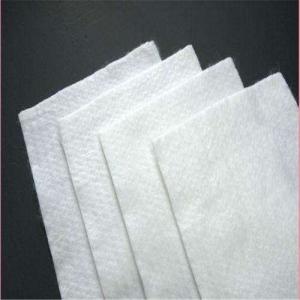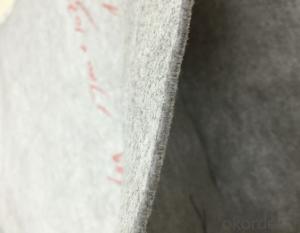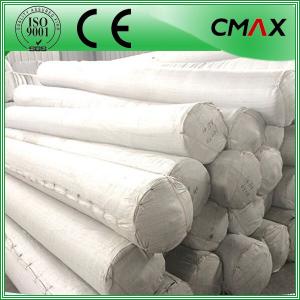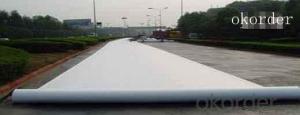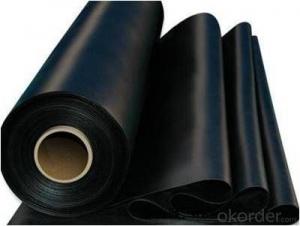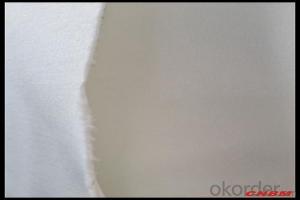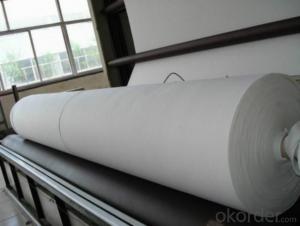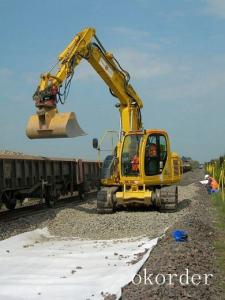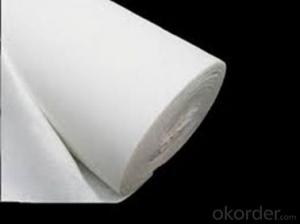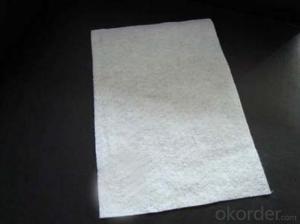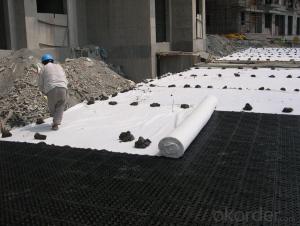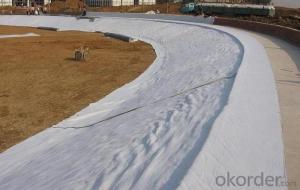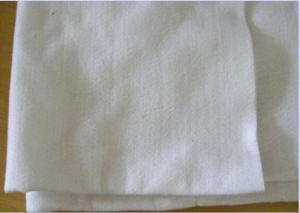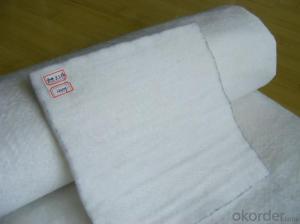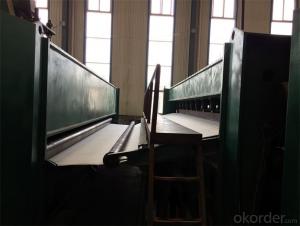Fehér Geotextil PP Civil Woven Geotextiles Fabric for Railway-CNBM
- Loading Port:
- China main port
- Payment Terms:
- TT OR LC
- Min Order Qty:
- 1000 m²
- Supply Capability:
- 1000000 m²/month
OKorder Service Pledge
OKorder Financial Service
You Might Also Like
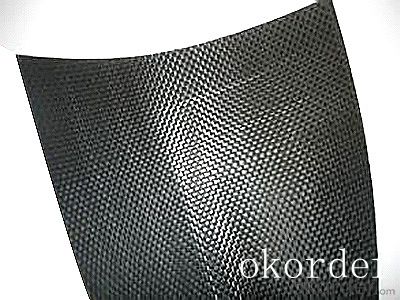
| NO. | Specifications and indicators | 100 | 150 | 200 | 250 | 300 | 350 | 400 | 450 | 500 | 600 | 800 | Remark |
| 1 | Deviation of mass per unit area2)(%) | -8 | -8 | -8 | -8 | -7 | -7 | -7 | -7 | -6 | -6 | -6 | |
| 2 | Thickness (mm≥) | 0.9 | 1.3 | 1.7 | 2.1 | 2.4 | 2.7 | 3 | 3.3 | 3.6 | 4.1 | 5 | |
| 3 | Amplitude-deviation(%) | -0.5 | |||||||||||
| 4 | Breaking strength(KN/m≥) | 2.5 | 4.5 | 6.5 | 8 | 9.5 | 11 | 12.5 | 14 | 16 | 19 | 25 | LD/MD |
| 5 | Elongation at break(%) | 25-100 | LD/MD | ||||||||||
| 6 | CBR burst strength(KN≥) | 0.3 | 0.6 | 0.9 | 1.2 | 1.5 | 1.8 | 2.1 | 2.4 | 2.7 | 3.2 | 4 | |
| 7 | Equivalent aperture090(095)(mm) | 0.07-0.2 | |||||||||||
| 8 | Vertical permeability coefficient(cm/s) | K×(10-1-10-3) | K=1.0-9.9 | ||||||||||
| 9 | Tearing strength(KN≥) | 0.08 | 0.12 | 0.16 | 0.2 | 0.24 | 0.28 | 0.33 | 0.38 | 0.42 | 0.46 | 0.6 | LD/MD |
| Note: TD=transverse direction LD=longitudinal direction | |||||||||||||
Our Service
1.On a regular basis or as per your request,we entrust national testing agencies to conduct quality inspections
2. Strictly in accordance with the ISO9001-2008 international quality system standard,we monitor and manage the whole process throughout production,quality testing,and measurement to ensure product quality
3. For quality-related construction delay or substandard construction(except for damage or losses due to customer’s responsibility or irresistible natural disasters),we have refunding,replacement,and repair services.We will respond to customers’ feedbacks on quality issues within 24 hours.
4.In order to provide customers with comprehensive technical support,we will provide technical and other related information upon request in a timely manner.
5.In required,we will appoint specialized technicians to the construction site to give technical trainings to construction people,and offer technical guidance throughout the whole construction process.
6.For damage due to shipment and delivery,after we receive the complaint,we will check the issure through provided pictures and videos.If our responsibility is confirmed,we wil offer free replacement.
7.When the construction is completed,as your request,our technical staff may participate in the final acceptance.
FAQ:
Q: What kind of payments does jenor support?
A: T/T, L/C, Cash are accepted.
Q: Do you charge for the samples?
A: Accordeing to our company policy, the samples are free, we only charge the freight fee. And we will return the freight fee during the next order.
Q: Can you produce according to customers' design?
A: Sure, we are professional manufacturer, OEM and ODM are both welcome.
Q: Do you have other products?
A: Yes, please check the pictures:
- Q: How do geotextiles help in reducing the risk of landslides?
- Geotextiles help in reducing the risk of landslides by acting as a barrier against soil erosion. They are used to stabilize slopes and reinforce the soil, preventing it from sliding downhill. Geotextiles also allow for better drainage, which reduces the build-up of excess water in the soil, another common cause of landslides.
- Q: I am currently displaying my geotextile samples in a brochure type display holder.but its not really working for holding a large amount. i can only fit about 8 in each holder. not very practical. i have been perusing google and stuff but am not coming up with much. i see very large cases, or the same displays i have now. does anyone have any ideas????PS This would be sitting on the top ledge of my desk so i am not really wanting anything that stands on the floor. hopefully someone else out there can help!
- Brittney420? My type of woman! We should hang out, my name is Art and you can message me if you want my number. I'm 6' 160 Pounds, I got a job, a HUGE house and a dog. Sorry I couldn't answer your question though.
- Q: Can geotextiles be used for erosion control in riverbanks?
- Yes, geotextiles can be used for erosion control in riverbanks. They are often used as a protective barrier to prevent soil erosion by reinforcing the stability of the riverbank and allowing water to flow through while retaining the soil in place.
- Q: The vertical permeability coefficient of 400 g per square filament geotextile is generally how much
- 1.0 × 10-1cm / sK × (10-1-10-3) I specialize in the production of geotechnical materials
- Q: What is the difference between polypropylene geotextile, polypropylene geotextile and polyester geotextile
- The raw material is not the same as the clothes have the same cotton polyester tea is the same characteristics of the characteristics of acid-resistant polyester anti-purple better look at where to see where the 4935 penguins
- Q: Weaving geotextile construction should pay attention to what
- Weaving geotextile construction specifications: 1, before the construction of roadbed should be integrated clean up, the surface shall not have sharp corners. 2, geotextile is best to use mechanical erection, can also be used artificial laying. When laying, it should be noted that the rough side of the singeing up, and then one end fixed with a fixed, mechanical or human tension, tensile elongation of about 1 & amp;% to 1 & amp;%, Facing front laying. The fixture includes fixed and fixed metal. Fixed nails should be used cement nails or nails, nail length 8 ~ 10cm fixed iron can be thick lmm, width 3mm of the strip. 3, weaving geotextile and the length of the long, should be used industrial sewing machine sewing, sewing method using "dow" and "seam". Suture and geotextile should have a significant color difference in order to facilitate inspection.
- Q: How do geotextiles help in preventing soil compaction?
- Geotextiles help in preventing soil compaction by acting as a barrier between the ground and heavy machinery or vehicles. They distribute the weight more evenly, reducing the pressure on the soil and minimizing compaction. Additionally, geotextiles improve drainage and allow air circulation within the soil, which further helps in preventing compaction.
- Q: How do geotextiles aid in the protection of geomembranes?
- Geotextiles aid in the protection of geomembranes by acting as a barrier between the geomembrane and the surrounding soil or aggregate. They provide cushioning and support, preventing direct contact and potential damage to the geomembrane from sharp objects or uneven surfaces. Additionally, geotextiles can assist in preventing soil erosion and the migration of fine particles, enhancing the overall stability and longevity of the geomembrane installation.
- Q: How do geotextiles help with groundwater protection?
- Geotextiles help with groundwater protection by acting as a barrier that prevents the movement of contaminants and pollutants from entering the groundwater. They are designed to filter and separate soil particles, allowing water to pass through while trapping harmful substances. Additionally, geotextiles can also enhance the stability and permeability of soil, reducing the risk of erosion and promoting proper drainage, which further aids in protecting the quality and quantity of groundwater.
- Q: How do geotextiles contribute to soil stabilization in mining areas?
- Geotextiles contribute to soil stabilization in mining areas by providing reinforcement and preventing erosion. These synthetic materials are placed within the soil to enhance its strength and stability, reducing the risk of landslides and soil disturbances. Geotextiles also act as a barrier, preventing the migration of fine particles, thereby improving soil filtration and preventing contamination of nearby water bodies.
Send your message to us
Fehér Geotextil PP Civil Woven Geotextiles Fabric for Railway-CNBM
- Loading Port:
- China main port
- Payment Terms:
- TT OR LC
- Min Order Qty:
- 1000 m²
- Supply Capability:
- 1000000 m²/month
OKorder Service Pledge
OKorder Financial Service
Similar products
Hot products
Hot Searches
Related keywords
